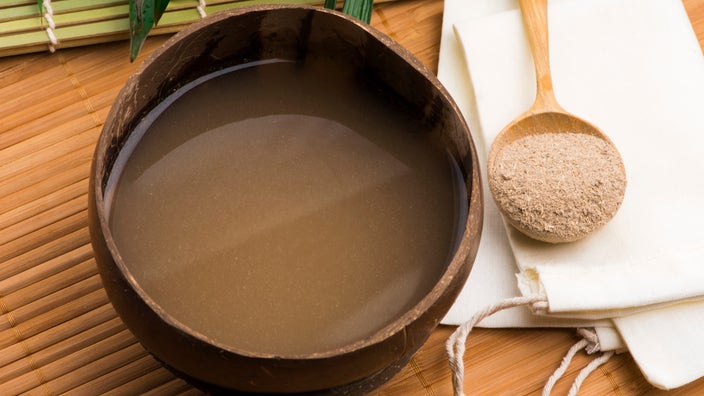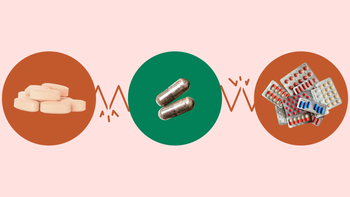
What Is Kava, and Are There Health Benefits to Drinking It?
Key takeaways:
Kava is an herbal remedy that people take to help with stress and anxiety.
Research on the benefits and risks of kava has had mixed findings.
Most people can safely take kava in limited amounts. But there’s a small risk of potentially serious side effects, including liver problems.
Table of contents

For thousands of years, people have used herbs and plants to treat illness and support health. Kava is one such remedy that has been around for a long time but has grown in popularity. People have been turning to kava for anxiety and stress relief, among other uses. But what exactly is kava, and does research support its health benefit claims?
What is kava?
Kava, also called kava kava, is a drink or extract made from the kava root plant — Piper methysticum. The plant is a member of the pepper family and grows on the Pacific Islands. Indigenous people of these islands have used kava for centuries. In local languages, the word “kava” refers to the drink’s bitter taste.
Natural remedies for anxiety: Learn more about how certain herbs and supplements may help lessen anxiety.
Adaptogens and stress: There’s growing interest in using adaptogens for stress. Check out what the research shows about their benefits and safety.
Essential oils for pain relief: Looking for a natural way to ease muscle and joint pain? Learn about how these essential oils may help relieve soreness.
What is kava used for?
Kava for anxiety and stress relief are among the most common reasons that people take it. Other traditional uses of kava include:
Pain relief
Relaxation
Sacred ritual purposes
Scientists are also studying kava’s effects for its potential uses in treating inflammation, brain-related conditions, and cancer. But these are new areas of research.
Search and compare options
What is in kava, and what does it do?
The active substances in kava are called kavapyrones, or kavalactones. If you’re wondering what kavalactones are, you aren’t alone. Scientists don’t fully understand how these substances work. But they may affect how nerves send messages throughout the body.
For example, scientists know that kava affects GABA (gamma-aminobutyric acid) nerve receptors. Alcohol and certain medications for anxiety and pain also work on these receptors. For some people, taking kava results in a feeling of calm or helps with pain relief. So this may point to how kava works, but more research is needed.
Short-term kava benefits
The research on kava’s benefits and safety has been mixed. But as a natural remedy for anxiety, there’s more evidence to support kava’s use than with other herbs and supplements.
Kava may help with short-term stress and worry, especially if a particular situation is the root cause. Kava may also help with symptoms of anxiety during menopause. But it’s probably less helpful for long-term or generalized anxiety. Keep in mind that there’s no data on the safety of using kava as a long-term treatment for anxiety.
Kava side effects
Many people assume that herbal remedies like kava don’t have side effects because they come from nature. But that’s not always the case. Here are some of kava kava’s possible side effects:
Headache
Dizziness
Sleepiness
Feeling down or depressed
Diarrhea
Numbness in the mouth, throat, or tongue
Read more like this
Explore these related articles, suggested for readers like you.
Kava interactions
Although it’s unusual to experience serious side effects when taking kava by itself, there’s potential for kava to interact with other substances and medications. Talk with a healthcare professional or pharmacist before taking kava with:
Alcohol
Medications that cause drowsiness, like sedatives
Medications that affect the liver, like acetaminophen (Tylenol)
Anxiety medications, like benzodiazepines
Muscle relaxants
Medications used to treat Parkinson’s disease
Medications that are similar to dopamine as well as those that block dopamine, like haloperidol (Haldol)
MAOIs (monoamine oxidase inhibitors)
The potential risks of these interactions include liver damage and coma. And, keep in mind, this isn’t a complete list of substances with which kava might interact.
Are there kava drinks?
The traditional way to consume kava is to drink it as an herbal tea. Kava drinks are made by grinding up kava roots into a powder, which is then stirred into water or coconut milk. Apart from the drinkable forms like kava tea, kava is also available as a:
Powder
Extract
Tablet
Capsule
Is kava like alcohol?
Some of kava’s effects are similar to those of alcohol. Kava seems to produce a relaxing effect that’s similar to that of alcohol, but with less mental clouding.
Because kava relaxes muscles, some of the physical effects are also similar to those that occur with alcohol. For example, when taken by itself, kava may slow down reaction times. But this finding is based on small studies, and the observed differences in reaction times between people who took kava and those who did not (placebo) wasn’t significant.
And although the evidence is mixed, one study found that having alcohol and kava together resulted in more impairment than alcohol alone. In other words, kava might increase the effects of alcohol.
Kava doesn’t seem to be addictive in the same way that alcohol can be. But more research is needed on kava’s risks and effects.
Is kava safe?
Kava is most likely safe in small amounts. Most experts agree that dosages under 400 mg of kava a day are likely safe for most people. But the appropriate dosage may be different from person to person.
If you take too much kava at once, you may experience:
Weak or uncoordinated muscles
Nausea
A slight fever
Dilated (large) pupils
Red eyes
Feeling very sleepy
People who take a lot of kava over longer periods of time may experience:
Mood changes
Weight loss
Dry and scaly skin
Shortness of breath
A loss of interest in relationships and activities
More frequent infections
If you’re worried that you’re having an abnormal reaction to kava, call Poison Control at 1-800-222-1222. For serious symptoms, call 911 or go to the nearest emergency room.
Can kava cause liver damage?
In recent studies, the risk of liver damage related to kava appears to be small but real. Liver damage from kava may be mild or severe. But, in most cases, the damage is reversible and improves after a couple of months of not taking kava.
Kava has been restricted or banned in some countries because of the potential for liver damage. In 2002, the FDA issued a consumer advisory based on the findings of studies on kava-related liver damage.
More recent studies suggest that the risk of liver damage is higher with:
Doses of kava that are too high
Poor-quality kava
Kava in combination with alcohol and medications that affect the liver
Long-term use of kava
Who should not take kava?
Except for children, limited amounts of kava are likely safe for most people. But kava may be riskier for some people. Avoid kava if you:
Have liver disease
Will be driving or operating heavy machinery
Are also drinking alcohol or taking medications that cause sedation
Are pregnant or breastfeeding
Will be having surgery or a procedure involving anesthesia
Talk with a healthcare professional if you have questions about or are considering taking kava. Be sure to provide them with a full list of your medications and supplements, so they can help you weigh the benefits and risks of taking kava.
The bottom line
People have used kava kava as an herbal supplement and traditional remedy for a long time. Some research suggests that it may have relaxing or stress-relieving effects for some people. And scientists continue to study other potential benefits. But just like any medication, supplement, or treatment, it’s not right for everyone. It’s best to talk with a healthcare professional about kava, especially if you take medication or have certain health conditions.
Why trust our experts?



References
Alcohol and Drug Foundation. (2024). Kava.
Aporosa, S. A., et al. (2019). De-mythologizing and re-branding of kava as the new ‘world drug’ of choice. Drug Science, Policy and Law.
Asher, G. N., et al. (2017). Common herbal dietary supplement–drug interactions. American Family Physician.
Better Health Channel. (2022). Kava. Victoria State Government.
Bian, T., et al. (2020). Kava as a clinical nutrient: Promises and challenges. Nutrients.
Centers for Disease Control and Prevention. (2002). Hepatic toxicity possibly associated with kava-containing products — United States, Germany, and Switzerland, 1999-2002.
Davies, M. (2003). The role of GABAA receptors in mediating the effects of alcohol in the central nervous system. Journal of Psychiatry and Neuroscience.
Foo, H., et al. (1997). Acute effects of kava, alone or in combination with alcohol, on subjective measures of impairment and intoxication and on cognitive performance. Drug and Alcohol Review.
Garakani, A., et al. (2020). Pharmacotherapy of anxiety disorders: Current and emerging treatment options. Frontiers in Psychiatry.
Lakhan, S. E., et al. (2010). Nutritional and herbal supplements for anxiety and anxiety-related disorders: Systematic review. Nutrition Journal.
Mental Health America. (n.d.). Kava.
Montague, Z. (2017). Stressed New Yorkers take to kava, ‘nature’s Xanax’. The New York Times.
National Center for Complementary and Integrative Health. (2020). Kava. U.S. Department of Health and Human Services.
National Institute of Diabetes and Digestive and Kidney Diseases. (2018). Kava kava. LiverTox: Clinical and Research Information on Drug-Induced Liver Injury [Internet].
Pittler, M. H., et al. (2003). Kava extract versus placebo for treating anxiety. Cochrane Database of Systematic Reviews.
Raduege, K. M., et al. (2004). Anesthetic considerations of the herbal, kava. Journal of Clinical Anesthesia.
Sarris, J., et al. (2019). Kava for generalised anxiety disorder: A 16-week double-blind, randomised, placebo-controlled study. Australian and New Zealand Journal of Psychiatry.
Smith, K., et al. (2018). The effectiveness and safety of Kava Kava for treating anxiety symptoms: A systematic review and analysis of randomized clinical trials. Complementary Therapies in Clinical Practice.
Wainiqolo, I., et al. (2015). Is driving under the influence of kava associated with motor vehicle crashes? A systematic review of the epidemiological literature. Australian and New Zealand Journal of Public Health.





























